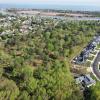How can Delaware plan clean energy, sustainable communities and a livable climate? Currently, we are critically failing on all those metrics. If the past and present are a key to the future, Delaware's outlook is bleak, indeed.
The local Indian River power plant has a poor history of air and water pollution.
A substandard fly ash pile, leaches heavy metal toxins into the Indian River watershed with each storm-surge event. Our communities are not sustainable.
Very few if any net zero buildings or houses requiring little energy to heat or cool are constructed.
The state’s waterways are 90 percent swimming or fishing impaired. The local ocean becomes more polluted each day, with DNREC failing statutory compliance on a weekly basis. This state agency has a sordid history of regulatory, moral and ethical amnesia. The rewriting of the Coastal Zone Act to accommodate renewal of heavy industry, including the anticipated supply chain for an offshore wind farm, is a disaster at best and a revival of a failed 1960s business model.
So everyone is clear, the dialogue and pathway of alternative energy and conservation is a critical one. Delaware’s energy portfolio must include extensive solar and geothermal applications. Passive heating and cooling building standards are needed.
These projects will create jobs. Today. Not in five, 10 years or 20, as theoretically proposed with ocean wind projects.
The building of an offshore wind farm, in habitat that is an essential pathway for critically endangered species of marine life, is now and will always be a mistake. We must conserve and protect migratory flyways and negate future environmental risk assessments by simply not building offshore wind projects.
We have created the ocean’s pervasive plastic and trash, increased water acidity with our carbon use by 30 percent, contributed shipping noise and traffic; all detrimental and potentially fatal impacts. Today, officials in Delaware are considering yet another piece of anthropogenic garbage - wind farms.
Haven’t we done enough damage? As I always say, human need and greed have superseded our role as sentient beings on this planet.
Currently, NOAA has declared an Unusual Mortality Event for Right and Humpback whales, with large numbers of mortalities in 2016-17. Necropsy evidence cites these whales as underfed, searching in new feeding grounds for diminishing prey sources. How can Delaware justify yet another habitat fragmenter with an offshore wind farm as these magnificent creatures struggle for survival and adaptation in a world that we as humans have altered forever?
According to the programmable Environmental Impact Statement for Block Island Wind, seismic testing is a necessity for siting the project and planning turbine base locations. Side and chirp scanners are utilized with upwards of 205 decibels. Many people in the coastal communities in Delmarva are outspoken and opposed to seismic noise impacts on marine life.
The difference between established offshore wind in Europe and the United States is simple...the spatial and regulatory inclusion of large baleen whales and sea turtles under Marine Mammal Protection Act and Endangered Species Act.
Electromagnetic fields generated with large-scale electric production and transmission present a significant obstacle for the five endangered or threatened sea turtle species which summer in Delaware waters. How do proven science, required future environmental studies for permitting, and federal laws overlap? In a long, protracted and contentious battle for the inalienable rights of all ocean life.
How is it even possible that closed-door meetings in Dover have transpired between wind’s private industry and appointed officials of the state, including discussion for a landing site at Delaware Seashore State Park for the onshore power line? This is a violation of codified ethics. State parks are a matter of public trust and common interest for all citizens.
Subsidies for alternative energy programs are planned to expire at the end of 2019. With an ever-increasing federal deficit, where are the future subsidies to offset this costly boondoggle?
I hope this meeting is the last and final public consideration for a wind energy project off Delaware.
Gregg W. Rosner
W. Fenwick Island





















































